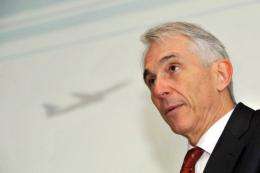A split widened within the aviation industry Tuesday over EU charges for carbon emissions. "Non-European governments see this extra terrestrial tax as an attack on their sovereignty," International Air Transport Association (IATA) director general Tony Tyler, pictured in 2011, said in a speech to the European Aviation Club.
A split widened within the aviation industry Tuesday over EU charges for carbon emissions, as Europe's low-cost carriers accused Chinese and US rivals of "gunboat" diplomacy against the system.
A day after China barred its airlines from complying with what many consider a tax, the head of the International Air Transport Association (IATA) warned that several nations view the EU scheme as an "attack on sovereignty".
"Non-European governments see this extra terrestrial tax as an attack on their sovereignty," International Air Transport Association (IATA) director general Tony Tyler said in a speech to the European Aviation Club.
Airlines have denounced the system as a new tax and warn that it would cost the industry 17.5 billion euros ($23.8 billion) over eight years. The IATA claims to represent 84 percent of global passenger and cargo traffic.
But the head of the European Low Fares Airline Association, who claims to account for 43 percent of flights within the EU, said the United States and other opponents should work harder to develop their own plans to reduce harmful emissions -- which would then trigger exemptions.
"If your challenge is found wanting in the supreme court of Europe, it is time to throw in the towel and comply," John Hanlon told AFP.
Tyler said at least 43 states have declared their opposition to the European Union's decision to bring aviation into an Emissions Trading System (ETS) set up to combat global warming.
And after the EU's executive Commission on Monday warned there would be no going back on laws that entered force on January 1, Tyler suggested commercial disobedience was a valid tactic.
"Some non-European airlines may have to choose whether to obey the law of their land or that of Europe," he told the audience of aviation executives, EU regulators and lawyers.
Tyler called for a global deal to ensure a level playing field. He said this should be agreed through the International Civil Aviation Organization (ICAO), an arm of the United Nations.
He said the current, unilateral action by the EU had created "an intolerable situation," and indicated that a "trade war" was the likeliest outcome after the "bold action" undertaken by China.
To avoid "an impossible choice," he said "a global scheme developed through ICAO would provide a superior solution both for managing aviation's emissions and to resolving the political problems caused by extending the scheme beyond Europe's borders.
"But time is not on our side. Airlines from Europe may face some retaliatory action," he underlined.
The system went ahead despite a plea by US Secretary of State Hillary Clinton for the EU to halt or delay its application, and the European Court of Justice has already rejected the legal basis of a challenge raised in London by north American airlines.
Companies that refuse to comply could be fined and denied the right to land in the 27-state EU in extreme cases.
But Chinese airlines are unlikely to be penalised immediately as carriers have until April 30 next year to calculate their annual emissions and buy polluting rights for 2012.
Some airlines, including US carrier Delta Air Lines, have already decided to add a surcharge to passenger tickets.
The European Commission argues that the cost for airlines is manageable, estimating that the scheme could prompt carriers to add between 4.0 and 24 euros ($32) to the price of a round-trip long-haul flight.
Some 655 million people flew in Europe last year, and EU climate action commissioner Connie Hedegaard said the additional cost per passenger for Indian airlines, for example, "will be around 65 cents."
Hanlon said his members "totally support" the EU measures.
"There is scope in the directive for exemptions where equivalent measures are introduced in other territories -- that's what the Chinese and the Americans should be concentrating on," he said.
"Instead, they're taking the gunboat approach rather than the diplomatic approach to getting a global solution."
Hedegaard's spokesman Isaac Valero Ladron underlined: "If ICAO agree a global deal, we will be so happy to modify our legislation -- but they have been unable to agree a deal for the last 20 years.
"Why should the steel industry come under the ETS and not aviation, or shipping, which is still outside its scope?"
(c) 2012 AFP
























